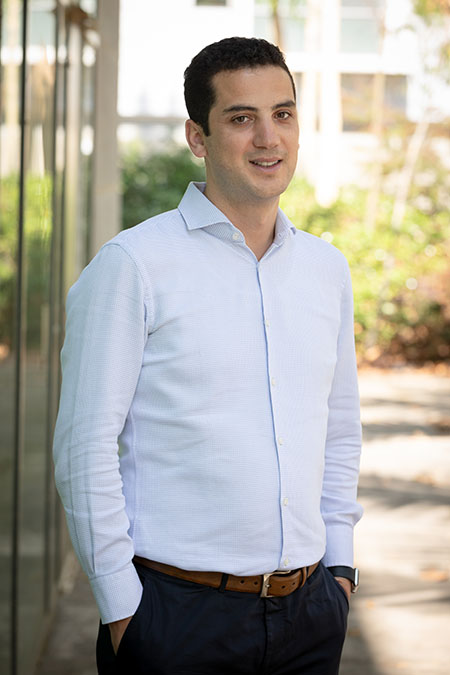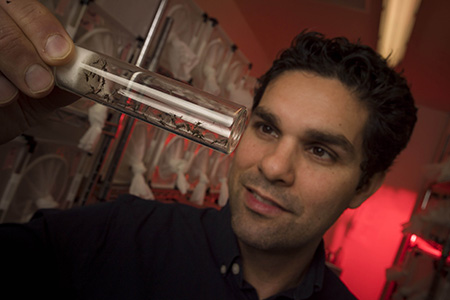News Release
Three UC San Diego Researchers Receive Top Honors with NIH Director's Awards
San Diego, Calif., Oct. 1, 2019 -- Three University of California San Diego researchers have received prestigious awards through the National Institutes of Health (NIH) High-Risk, High-Reward Research Program.
These awards, supported by the NIH Common Fund, were created to support unconventional approaches to major challenges in biomedical and behavioral research. The awards are given to exceptionally creative scientists proposing high-risk, high-impact research at all career stages.
Rob Knight, a professor of pediatrics in the UC San Diego School of Medicine, professor of bioengineering and computer science and engineering in the Jacobs School of Engineering and director of the UC San Diego Center for UC San Diego Center for Microbiome Innovation, was awarded the Pioneer Award. This award was established to encourage researchers at all career levels “to pursue new research directions and develop groundbreaking, high-impact approaches” to broaden their field and explore new research opportunities.
Shadi Dayeh, a professor of electrical and computer engineering in the Jacobs School of Engineering, and Omar Akbari, associate professor of cell and developmental biology in the Divison of Biological Sciences, were both awarded the New Innovator Award. This award honors early career scientists and supports their efforts to conduct trailblazing new research in the biomedical sciences.
"UC San Diego fosters a collaborative research environment, where faculty are encouraged to take risks, innovate, and change the world,” said UC San Diego Chancellor Pradeep K. Khosla. “By learning how microbes affect health, how vector-borne diseases are transmitted, and how the brain is structured, these three faculty members are working to improve health and enrich human life and society. I’m looking forward to seeing their breakthroughs make a difference."
 Rob Knight Rob Knight |
Knight joined the UC San Diego faculty in 2015. His work is focused on understanding the multitude of ways in which microbes affect our daily lives, from their presence in and on our bodies and how they are involved with disease to how they play roles in diverse ecosystems around the world. His lab uses advanced DNA sequencing and computational techniques to analyze and understand microbial communities.
With funding from the Pioneer Award, Knight will work on new, integrative approaches for studying how the gut microbiome can be optimized to help prevent and treat infections. Changes in microbial activity in the gut can impact organs throughout the body, with dramatic health effects. Knight plans to develop methods for mapping the interactions between dietary inputs, gut bacteria and immune response to better understand how diet influences immune system function, generating new opportunities for promoting a healthy microbiome and treating infections.
Prior to joining UC San Diego, Knight was a faculty member at the University of Colorado, Boulder, where he worked on such projects as profiling the microbes found in the saliva of komodo dragons to support conservation efforts and understanding the differences in the microbiomes of babies born via cesarean section or delivered vaginally. His team has also developed a number of bioinformatics and laboratory tools to support the study of microbiomes, generating resources for scientists around the world.
Knight’s work has garnered a number of accolades, including the 2017 Massry Prize and the 2015 Vilcek Prize in Creative Promise for the Life Sciences. He has co-founded several citizen science efforts to support microbiome studies, including the Earth Microbiome Project and the American Gut Project. He is author of Follow Your Gut: The Enormous Impact of Tiny Microbes and co-author of Dirt is Good: The Advantage of Germs for Your Child’s Developing Immune System, books to help non-scientists understand the importance of a healthy microbiome.
 |
| Shadi Dayeh |
Dayeh, who joined UC San Diego in 2012, explores new nanofabrication techniques to build neural probes capable of mapping activity in individual neurons as well as across the entire human brain. The devices feature materials that are orders of magnitude thinner, more sensitive, flexible and less damaging to the brain than existing clinical devices.
Funding from the New Innovator Award will enable Dayeh and colleagues to develop new brain mapping technologies that can better guide neurosurgeons to remove brain tumors and epileptogenic tissue more precisely without damaging healthy brain tissue. In this project, researchers aim to develop a next-generation version of a clinical tool called an electrode grid, which is a plastic- or silicone-based grid of electrodes placed directly on the surface of the brain during surgery to monitor the activity of large groups of neurons.
The new electrode grid that Dayeh proposes will be integrated with high-resolution, colored light displays to essentially color code fine cortical activity and structures in the brain. This type of device will provide immediate visual feedback to the operating neurosurgeon, making it possible to perform neurosurgery resections at higher precision, in a shorter time frame and with potentially reduced risk to the patients.
Dayeh’s research spans expertise in materials science, electrical engineering and electrochemistry, and he works with experts from multiple fields, including neurosurgery, neuroscience and neurophysiology. His primary collaborator on this project is Sydney Cash, MD, PhD, at Massachusetts General Hospital. In previous projects, he has collaborated with clinicians at Jacobs Medical Center at UC San Diego Health, Brigham Women’s Hospital (Boston), Massachusetts General Hospital and Oregon Health and Sciences University. His lab efforts in the last few years enabled clinical research studies for first-in-human electrophysiological recordings with hundreds to thousands of channels.
 Omar Akbari Omar Akbari |
Akbari joined UC San Diego in 2017. A member of the Division of Biological Sciences’ Section of Cell and Developmental Biology and the Tata Institute for Genetics and Society, Akbari conducts research in the development of novel, genetically based solutions to mosquito-borne disease transmission. Akbari is a leading expert in Aedes aegypti mosquitoes, also known as “yellow fever mosquitoes,” which can also spread Zika, dengue and chikungunya — diseases with no effective vaccines. With billions of people at risk of infection from such vector-borne diseases, the immense health and economic burden warrants urgent responses through technologically based strategies.
Funding through the New Innovator Award will allow Akbari to foster new technologies that sustainably prevent vector-borne disease transmission. He plans to develop strategies for replacing populations of disease-carrying mosquitoes through CRISPR gene editing, by creating synthetic sensors that recognize viruses and trigger antivirus responses. The envisioned strategy would be the first steps toward creating an adaptive immune system for Aedes aegypti mosquitoes.
Akbari also leads a Defense Advanced Research Projects Agency (DARPA) project that is developing gene drive technologies to combat disease-carrying mosquitoes in California. He and his colleagues recently developed the first gene drive targeting the fruit fly Drosophila suzukii, an agricultural pest that has invaded much of the United States and caused millions of dollars in damage to high-value berry and other fruit crops. He also has developed a novel CRISPR-based control system that enables the generation of sterile males and hopes to develop this technology in disease vectors and agricultural pests. Using this technology, Akbari recently cofounded a new biotechnology startup company in San Diego named Agragene.
Media Contacts
Liezel Labios
Jacobs School of Engineering
858-246-1124
llabios@ucsd.edu